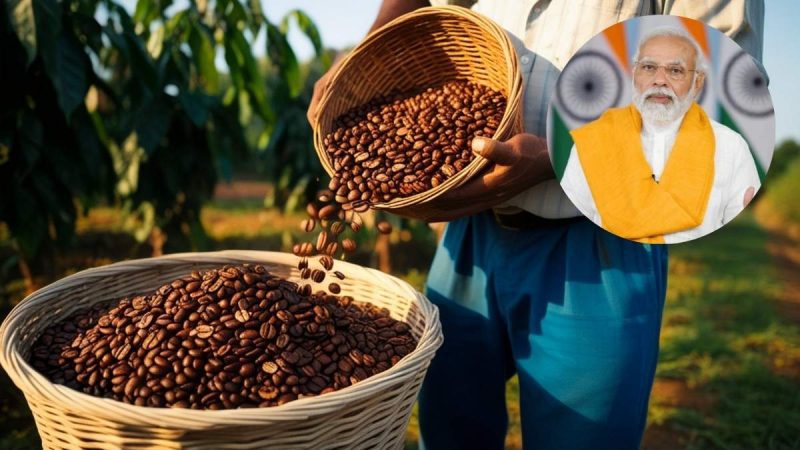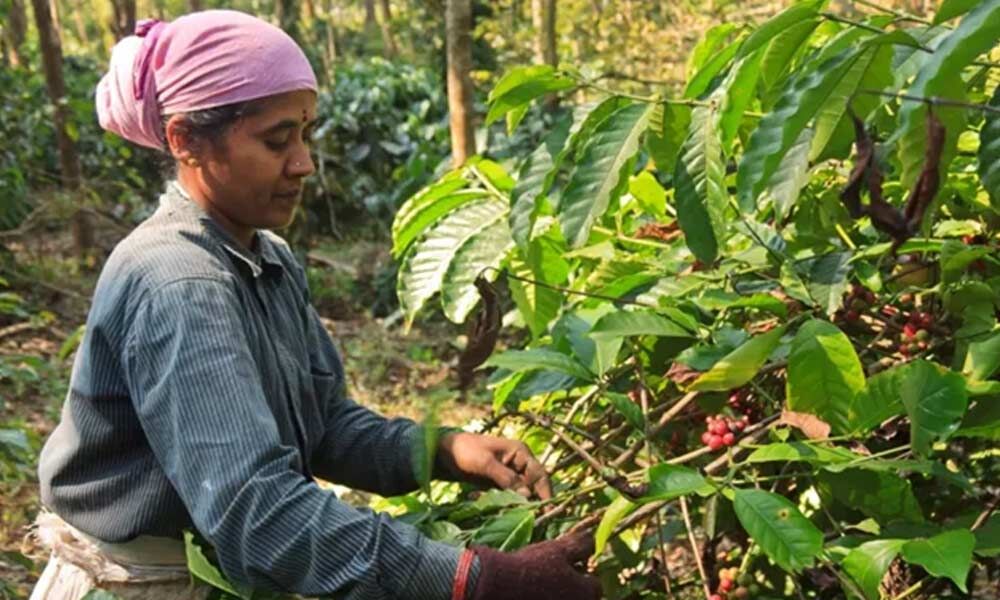Karnataka’s coffee planters have expressed appreciation for Prime Minister Narendra Modi’s recent praise of the state’s coffee industry, which he hailed as one of India’s finest agricultural success stories. The Prime Minister’s remarks, made during his recent address on rural entrepreneurship, have been welcomed across the Kodagu, Chikkamagaluru, and Hassan districts—the heart of India’s belt. Farmers and planters said that such recognition from the nation’s highest office gives their community a much-needed morale boost after years of battling volatile prices, climate disruptions, and policy delays. However, while gratitude runs deep, growers have also urged the Centre to translate words into tangible action by addressing long-pending issues that threaten the sector’s sustainability.
Background: Karnataka’s Coffee Legacy
Karnataka accounts for nearly 70 percent of India’s coffee production, making it the largest producer in the country and a key contributor to India’s agricultural exports. The lush hills of Kodagu, Chikkamagaluru, and Hassan are home to thousands of small and medium-scale coffee growers, many of whom have been cultivating coffee for generations. The region produces both Arabica and Robusta varieties, with Arabica being prized for its aroma and Robusta for its strength and yield.
Coffee cultivation in Karnataka has deep historical roots, tracing back to the 17th century when the Sufi saint Baba Budan is believed to have brought the first coffee seeds from Yemen to Chikkamagaluru. Over time, the state developed a thriving ecosystem that combined traditional cultivation techniques with modern processing. Today, Karnataka’s coffee is exported to over 80 countries, earning foreign exchange and providing employment to over seven lakh people, directly and indirectly. Yet, beneath this success lies a complex web of challenges—ranging from labour shortages and pest attacks to global price instability and policy inertia.
Modi’s Praise and the Farmers’ Reaction
In his address, Prime Minister Modi lauded the hard work of Karnataka’s coffee growers, noting how their efforts have helped position Indian coffee on the global map. He praised the blend of “tradition, innovation, and entrepreneurship” that defines the state’s coffee sector. His remarks particularly highlighted the success of local cooperatives and self-help groups that have brought rural women into the value chain.
For farmers, this recognition was both validating and emotional. “When the Prime Minister acknowledges our efforts, it gives us a sense of pride that our struggles are not invisible,” said Ramesh Bhat, a grower from Chikkamagaluru. Others echoed similar sentiments, noting that such national attention could reignite policy focus on long-ignored agricultural sectors like coffee. However, they were quick to add that beyond appreciation, the community needs direct intervention, policy reform, and infrastructure support to survive mounting economic pressures.
The Longstanding Challenges Brewing Beneath
Despite the optimism sparked by Modi’s remarks, Karnataka’s sector has been grappling with deep-rooted issues. Chief among them is the sharp fluctuation in global prices, which has left farmers vulnerable to market volatility. Prices are heavily influenced by international demand and climatic events in major producing countries such as Brazil and Vietnam.
Over the last decade, inconsistent rainfall, prolonged droughts, and erratic weather patterns have severely affected yields. The spread of diseases like white stem borer and leaf rust has compounded losses. Many small-scale growers have fallen into debt due to rising input costs, unremunerative prices, and lack of access to institutional credit. Farmers complain that despite multiple memorandums to both the Union and State governments, relief measures have remained minimal or delayed.

Labour Shortages and Cost Escalation
Another major concern for growers is the acute shortage of labour during harvest and pruning seasons. Traditionally, coffee estates in Karnataka have depended on migrant workers from neighbouring states like Tamil Nadu and Kerala. However, the post-pandemic migration patterns and rising wage demands have disrupted this workforce supply.
Planters now face rising operational costs without corresponding increases in returns. “The cost of labour has gone up by nearly 40 percent in the last five years,” said Ashwini Kaveri, a small planter from Kodagu. “At the same time, international coffee prices have remained stagnant, leaving us with almost no profit margin.” Many farmers have started diversifying their plantations with pepper and areca nut to offset coffee-related risks, but such shifts have affected coffee acreage and overall quality output.
Infrastructure and Market Access Gaps
Farmers and exporters also point to the lack of adequate infrastructure and marketing support. Many plantations are located in remote hilly areas with poor road connectivity, making transportation of produce costly and cumbersome. Despite being one of India’s key export commodities, post-harvest infrastructure such as curing works, grading facilities, and storage units remain insufficient in most -growing regions.
Growers have also sought the revival of Coffee Board marketing initiatives, which they say have weakened over the years due to bureaucratic delays and reduced funding. The absence of a robust procurement mechanism has left farmers at the mercy of middlemen, who often dictate prices. “We need government-backed platforms for direct trade and transparent pricing,” said Manoj Kumar, an exporter from Hassan. “The current system benefits intermediaries, not producers.”

Climate Change and the Future of Coffee
Climate scientists have repeatedly warned that rising temperatures and erratic monsoon patterns pose an existential threat to Karnataka’s coffee belt. Studies by the Indian Institute of Plantation Management predict that by 2050, nearly 40 percent of current coffee-growing areas may become unsuitable for cultivation due to changing rainfall and temperature patterns.
Farmers have already observed early signs of distress—prolonged dry spells, pest proliferation, and irregular flowering cycles. Experts recommend urgent adaptation measures such as promoting shade-grown , intercropping with native species, and investing in climate-resilient varieties. However, these efforts require both financial support and technical training, which small farmers find difficult to access. Without timely intervention, the very regions that once defined India’s identity could face irreversible decline.
Policy Demands from Growers
Following Modi’s remarks, several coffee associations have renewed their appeals to the Centre and the State for a comprehensive policy overhaul. Their key demands include:
-
Debt Relief and Loan Restructuring – Immediate waiver or rescheduling of outstanding loans to help small planters recover from consecutive crop losses.
-
Price Stabilisation Mechanism – Creation of a Coffee Price Stabilisation Fund to protect growers from international market fluctuations.
-
Infrastructure Development – Improved road access, warehousing, and cold storage facilities in major coffee zones.
-
Reform of Coffee Board – Greater autonomy and funding for the Coffee Board to ensure faster policy implementation.
-
Export Incentives and Branding – Support for marketing Indian globally under distinct origin labels like “Coorg Coffee” and “Baba Budan Hills Coffee.”
Growers argue that such steps would not only safeguard livelihoods but also strengthen India’s position as a sustainable coffee-producing nation.
Government’s Response and Current Initiatives
In response to the renewed demands, officials from the Coffee Board of India have assured that multiple policy measures are being reviewed. According to the Board, plans are underway to modernise curing infrastructure, streamline e-auction systems, and introduce digital traceability tools that allow international buyers to verify coffee origins.
The Union Ministry of Commerce has also initiated discussions on expanding India’s coffee footprint in non-traditional markets such as Japan, South Korea, and the Middle East. Meanwhile, Karnataka’s Agriculture Department has proposed a State Development Mission to promote value addition, mechanisation, and farmer training. However, planters argue that implementation remains slow and that coordination between state and central agencies needs to improve significantly.
Voices from the Hills: Farmers Speak Out
Among growers, a mix of optimism and frustration prevails. Lakshmi Gowda, a third-generation planter from Somwarpet, said, “We are grateful that the Prime Minister mentioned us. But we need better crop insurance, not just appreciation. Our lands are suffering due to erratic rains, and one bad season can wipe out our savings.”
Similarly, Mohan Reddy from Mudigere pointed out that farmers face a unique challenge of dual taxation, paying both agricultural levies and service-related charges due to the nature of exports. “We are neither fully treated as farmers nor as entrepreneurs. This identity crisis hurts us,” he added. Many farmers hope the government will address these specific anomalies through tailored policy interventions.
The Role of Cooperatives and Women Entrepreneurs
One of the silent revolutions in Karnataka’s coffee industry has been the rise of women-led cooperatives and small-scale entrepreneurs. Across Kodagu and Chikkamagaluru, several women’s self-help groups have entered roasting, packaging, and retail. Brands like Hallimane and Coorgi Brews have carved out niche markets by promoting organic, single-origin blends.
These ventures not only empower women economically but also bring innovation to traditional supply chains. However, entrepreneurs face hurdles such as limited access to credit, inadequate market exposure, and competition from corporate brands. Many have called for government incubation support and financial incentives to encourage more rural women to participate in coffee entrepreneurship.
Export Market Challenges
While Indian coffee enjoys global recognition for its unique flavour profile, exporters have raised concerns about stiff competition from Latin American and African producers. The lack of a comprehensive export promotion strategy, combined with inconsistent quality control, has limited India’s ability to command premium prices in global markets.
Industry experts suggest that India must aggressively market its coffee as a specialty product, capitalising on traceability and sustainability. “European buyers now demand ethical sourcing and zero-deforestation certification,” said Nitin Rao, a coffee exporter from Mangaluru. “Without government-backed certification and branding efforts, Indian coffee risks losing ground to other producing nations.”
Environmental Sustainability and Certification Gaps
Environmentalists argue that Karnataka’s sector, while rich in biodiversity, needs stronger sustainability practices. The Western Ghats, where most plantations are located, are ecologically sensitive zones. Excessive chemical use and deforestation for estate expansion have raised concerns about soil degradation and water scarcity.
Sustainability certifications such as Rainforest Alliance and Fair Trade can help improve environmental compliance and fetch better prices for growers. However, only a fraction of Karnataka’s estates currently meet these standards. Planters have requested financial incentives for certification processes, as they often involve high costs and complex documentation. Integrating sustainability into mainstream policy, they believe, would benefit both farmers and the environment.
Follow: Karnataka Government
Also read: Home | Channel 6 Network – Latest News, Breaking Updates: Politics, Business, Tech & More

